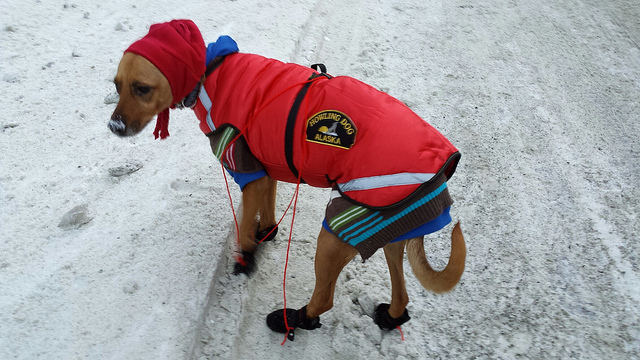Have you gotten your first puppy over the last few months, and now you’re wondering if you should buy them booties to protect their feet this winter? Wolves don’t need booties, but have our domesticated dogs lost some ability to protect their feet from the snow and cold? The truth is that most dogs are just fine without booties, but there are some situations where booties are recommended to protect your pup’s paws. Consider investing in some quality booties for your pup if they fall into one of the following categories.

#1 – Sled dogs
Sled dogs are endurance athletes that do generally need booties to protect their feet as they run for long periods through snow and over ice. They may be running for several hours through conditions that would even be tough on a wolf’s feet if they were running for long periods.
#2 – Dogs that walk on roads or sidewalks covered in salt or ice melt
Ice melt can be toxic to dogs, and the combination of salt and ice can burn the pads of your dog’s feet. If you walk your dog in an urban environment, you may strongly consider protecting your dog’s feet with some booties.

#3 – Dogs with furry feet
Dogs with a lot of hair on their feet can collect snowballs between their toes, which can be very painful until they melt. The constant gathering of snowballs on long hair can also lead to painfully tight hair mats, which can bother your dog until they are shaved out.
If your dog refuses to wear booties or you can’t find ones that fit properly, there are some things you can do to help protect your dog’s feet this winter. Soaking your dog’s paws in warm water for a few seconds when you come in can help rinse off ice melt or salt and melt snowballs that have formed in the fur on your dog’s feet. Keeping your dog’s feet trimmed tightly can also help prevent the accumulation of snowballs or debris. And putting paw wax or petroleum jelly on the pads of your dog’s feet before going outside can help prevent painful cracks in their paw pads.
(H/T: Vet Street, DogTime)

